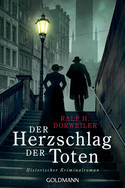Ken Follett (Engl. OV)
11.2014 Interview with Ken Follett at the Frankfurt Book Fair 2014.
Histo-Couch: Mr Follett, what was your motivation to write the Century Trilogy?
Ken Follett: I was asking myself: What is the most dramatic period in the history of the human race? And I realized: It’s the twentieth century! We had the First World War which was the most terrible war that human race ever known. Then we had the Second World War which was worse. And then we had the Cold War which if it would ever turned into a hot war, if it would ever become World War Three – it would have wiped this all out. But as well as that its our story. I was born in 1949, you were born in the twentieth century. The story of the twentieth century is about what we did and what our parents did and our grandparents.
Histo-Couch: How long did it last from the very first idea to writing down the last words?
Ken Follett: Seven years. I said I would write it down in seven years and I wish I had said nine, because seven years was not quite enough. So I’ve been working Saturdays and Sundays to finish it on time.
Histo-Couch: Did you know at the beginning of your writing process how exactly the whole story would end?
Ken Follett: Well, I spend the first six months reading the history of the twentieth century and deciding how to devide it up into novels and thinking about how to make these great events part of the lifes, the every day lifes of my characters. So that was a rough planning process for the whole trilogy. Then I started to plan the first book „Fall of Giants“. In general I spend a lot of time planning. So I always know the end before I start writing.
Histo-Couch: How did you manage to keep track of all your characters? Do you use family trees or cue cards?
Ken Follett: I use a computer program called „Excel“ (he smiles), which is normally used by accountance. But every time there is a new character I put the characters name in the program, and age, so then the program calculates for me how old the person is in the next chapter. And also a description so that if I say that this person has – let us say – hazel eyes and dark brown hair and then she is not in the story for a hundred pages I just check back just to make sure that I don’t use exactly the same words to describe her a second time.
Histo-Couch: Did you visit any locations in Germany for your research and what was the most impressive situation for you?
Ken Follett: Well, I had a good look around Berlin, in particular the locations where the war used to be because I have several very dramatic scenes, particularly in „Edge of Eternity“, where people escape over the wall and for those kind of scenes which are action scenes it is really important to get the little details right. Because action scenes like climbing or digging a tunnel or driving a truck through a gate – you have to get those physical details right. So that was my Berlin research. I mean, I am familiar with Berlin, I’ve been coming to Berlin for years, so I didnt need to do very much special research.
Histo-Couch: Do you like Berlin?
Ken Follett: Oh yeah, its a great and exciting city. Especially now! 26 years ago it was not so exciting.
Histo-Couch: For you as a man from Great Britain – how was it to write about the downfall of the wall from a german point of view? Did it change your attitude towards this event?
Ken Follett: Oh, yes, because it was much better to write about this from the german point of view because Germans felt passionately about this. Of course we all knew about the wall and we hated it because it was a symbol of the divided world. But for people in other countries it didn’t actually destroy our family life. And of course when writing this I had to imagine the german family whose lifes had been changed by this horrible war and I had to think about how much they hated it and how happy they would be when it fell down.
Histo-Couch: Do you still know where you have been on November 9th 1989, when you heard about the opening of the Berlin Wall?
Ken Follett: Yes, I was at my house in Chelsea in London watching TV. But the interesting thing was: I thought, tomorrow the russian tanks will come back, because thats what we saw in Budapest and Prague and Warsaw. There was a moment of hope and then the tanks came in. And I thought the tanks would coming in Berlin and so did a lot of people in the United Kingdom and in the United States. But german people knew it was the end, I guess, because Germans had seen how the East German government just collapsed and became powerless. We weren’t as aware of that. We were pleased – Hooray! – but maybe tomorrow it will be back to normal.
Histo-Couch: Is there any character in the trilogy that is similar or close to Ken Follett?
Ken Follett: (laughs) Yes, Dave Williams, who is a teenager in London in the sixties is in some ways like me. I was a teenager in London in the sixties. And he plays the guitar and I play the guitar. And he’s very interests in clothes, and so when Dave dresses up on Saturday night to go out dancing I don’t have to do any research, I just have to remember what I put on.
Histo-Couch: Do you read your novels again after they are published?
Ken Follett: Not normally, no. Well, its a bit dull, I know whats gonna happen …
Histo-Couch: Is there any of your books of which you now would say you would write today completely different as it was when it was published for the first time?
Ken Follett: No, I dont think so. My early books were not successful. I wrote ten unsuccessful books before I had a bestseller. But even going back to those …You know, I cant imagine how I could change them somehow. You know, they’re finished, they’re not very good, but I can’t imagine going back and, well, if I change this and change that …I’d rather start a new story.
Histo-Couch: Will you return to Kingsbridge?
Ken Follett: Oh yes. Yes, I’m working on a Kingsbridge story now. I finished „Edge of Eternity“ on Christmas and since then I am thinking about my next book. And I have a story that is mainly set in Kingsbridge, but in the 16th century, during the reign of Queen Elizabeth I.
Histo-Couch: How important is it for you to make music as an offset for writing?
Ken Follett: Well, it really is a contrast to writing because writing is very cerebral. My writing is very plotted, there’s a lot of deception and intrigue and I have to keep all this in my head. Whereas playing in a band – it’s very sensory. It’s music, it’s about the fingertips and the ears -you don’t have to plan it very much. Somebody says, this is a twelve-bar blues and the key is E and the drummer goes (slaps his thighs) like this and we start to play.
Histo-Couch: You have a gig this evening?
Ken Follett: Were playing tonight here in Frankfurt in a club called „Orange Peel“ and we’re gonna start playing at 22:15 and go on as long as they wanna dance.
Histo-Couch: Are you more nervous when making music or when writing?
Ken Follett: Well, I’m not nervous about either. I am very happy writing and I’m very happy playing the guitar. The only thing that makes me nervous is doing television interviews in French.
Histo-Couch: Thank you very much!
Ken Follett: Youre welcome!











Neue Kommentare